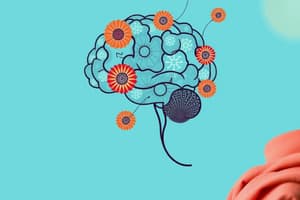Podcast
Questions and Answers
What is the main focus of structuralism in psychology?
What is the main focus of structuralism in psychology?
- Studying the unconscious mind
- Understanding consciousness through introspection (correct)
- Observing and controlling behaviors
- Examining how mental activities aid adaptation
Which psychologist is known for founding psychoanalytic theory?
Which psychologist is known for founding psychoanalytic theory?
- Sigmund Freud (correct)
- William James
- B.F. Skinner
- Wilhelm Wundt
What does Maslow's Hierarchy of Needs depict at its top level?
What does Maslow's Hierarchy of Needs depict at its top level?
- Physiological
- Esteem
- Security
- Self-Actualization (correct)
Which concept is most associated with John B. Watson?
Which concept is most associated with John B. Watson?
Which area of psychology focuses specifically on the diagnosis and treatment of psychological disorders?
Which area of psychology focuses specifically on the diagnosis and treatment of psychological disorders?
What is the contribution of Noam Chomsky to psychology?
What is the contribution of Noam Chomsky to psychology?
What aspect of human functioning does biopsychology primarily examine?
What aspect of human functioning does biopsychology primarily examine?
What is the primary focus of humanistic psychology?
What is the primary focus of humanistic psychology?
What is the primary focus of Sports & Exercise Psychology?
What is the primary focus of Sports & Exercise Psychology?
Which research method involves collecting data from the same group of individuals over an extended period?
Which research method involves collecting data from the same group of individuals over an extended period?
What does a positive correlation between two variables indicate?
What does a positive correlation between two variables indicate?
Which of the following best describes a confounding variable?
Which of the following best describes a confounding variable?
What is the main purpose of naturalistic observation in research?
What is the main purpose of naturalistic observation in research?
In a double-blind study, who remains uninformed about group assignments?
In a double-blind study, who remains uninformed about group assignments?
What does an operational definition provide in research?
What does an operational definition provide in research?
In psychology, what does the term 'placebo effect' refer to?
In psychology, what does the term 'placebo effect' refer to?
What is the primary role of acetylcholine in the nervous system?
What is the primary role of acetylcholine in the nervous system?
Which area of the brain is primarily responsible for speech comprehension?
Which area of the brain is primarily responsible for speech comprehension?
What does genetic variation contribute to in a species?
What does genetic variation contribute to in a species?
Which neurotransmitter is associated with mood regulation and learning?
Which neurotransmitter is associated with mood regulation and learning?
What is the function of the prefrontal cortex?
What is the function of the prefrontal cortex?
What happens at the threshold of excitation in a neuron?
What happens at the threshold of excitation in a neuron?
Which structure connects the two hemispheres of the brain?
Which structure connects the two hemispheres of the brain?
What is the main function of the somatosensory cortex?
What is the main function of the somatosensory cortex?
What is the primary function of the independent variable in an experiment?
What is the primary function of the independent variable in an experiment?
What does informed consent ensure for research participants?
What does informed consent ensure for research participants?
Which of the following best describes validity in research?
Which of the following best describes validity in research?
What role does the Institutional Review Board (IRB) play in research?
What role does the Institutional Review Board (IRB) play in research?
What is the purpose of conducting a statistical analysis in research?
What is the purpose of conducting a statistical analysis in research?
Deception in experimental research is utilized for what primary purpose?
Deception in experimental research is utilized for what primary purpose?
Which of the following accurately represents a random sample?
Which of the following accurately represents a random sample?
Why is replication important in psychological research?
Why is replication important in psychological research?
Flashcards are hidden until you start studying
Study Notes
Foundations of Psychology
- Psychology is the scientific study of the mind and behavior.
- Structuralism focuses on understanding consciousness through introspection; founded by Wilhelm Wundt, who established the first psychology lab and authored the first psychology textbook.
- Functionalism, championed by William James, examines how mental activities facilitate adaptation to environments.
- Psychoanalytic Theory, developed by Sigmund Freud, highlights the influence of the unconscious on conscious thoughts and behavior.
- Gestalt Theory suggests that human perception is holistic, credited to Wertheimer, Koffka, and Kohler.
- Behaviorism emphasizes the observation and control of behaviors; key figures include Pavlov, Watson, and Skinner.
- Humanism asserts the inherent potential for goodness in all individuals, pioneered by Abraham Maslow and Carl Rogers.
Key Theorists and Concepts
- Wilhelm Wundt: One of psychology's founders, recognized for experimental methods, focusing on conscious experience.
- William James: The first American psychologist, associated with Functionalism and the study of behavior function.
- Sigmund Freud: Originated Psychoanalysis, emphasizing unconscious processes influenced by childhood events.
- John B. Watson: The father of Behaviorism, prioritized observable behavior over introspection.
- B.F. Skinner: Known for his work on the relationship between behavior and consequences, especially through reinforcement.
Maslow's Hierarchy of Needs
- Hierarchy consists of five levels:
- Physiological (basic needs)
- Safety (security)
- Social (connections)
- Esteem (respect)
- Self-Actualization (fulfillment of potential)
Branches of Psychology
- Developmental Psychology: Explores physical and mental changes across the lifespan, including moral reasoning and social skills.
- Health Psychology: Studies the interplay of biology, psychology, and socio-cultural factors on health.
- Social Psychology: Investigates how individual interactions influence behavior and social norms.
- Personality Psychology: Focuses on conscious and unconscious thought patterns and personality traits (O.C.E.A.N: Openness, Conscientiousness, Extraversion, Agreeableness, Neuroticism).
- Clinical Psychology: Manages diagnosis and treatment of psychological disorders.
- Industrial-Organizational Psychology: Applies psychological principles in workplace environments.
- Sports & Exercise Psychology: Addresses psychological factors and performance in sports.
Research Methods
- Naturalistic Observation: Records genuine behaviors in their natural settings.
- Surveys: Collects data from diverse populations efficiently.
- Longitudinal Studies: Observes the same subjects over time to track changes.
- Cross-Sectional Research: Compares different age groups or segments at a single time.
- Archival Research: Analyzes existing data for emerging patterns and relationships.
Experimental Design
- Control Group: Participants not exposed to the manipulated variable.
- Experimental Group: Participants exposed to the manipulated variable.
- Independent Variable: The manipulated factor in an experiment.
- Dependent Variable: The outcome measured to assess the effect of the independent variable.
- Placebo Effect: The influence of participants' expectations on their experience in experiments.
- Ethics: Certain questions can't be ethically studied through experimental methods (e.g., subjecting participants to harm).
Neuropsychology and Behavior
- Biopsychology: Links biological processes to behavior, emphasizing the nervous system's structure and function.
- Genetics: Investigates how genetic factors influence physiological and psychological traits.
- Neurotransmitters: Chemicals that transmit signals, crucial for brain communication, with specific roles such as:
- Dopamine: Affects mood, learning, and sleep.
- Serotonin: Impacts mood and sleep patterns.
- Acetylcholine: Involved in muscle action and memory.
Brain Structure and Function
- The Cerebral Cortex provides higher-level processing, while specific areas serve specialized functions:
- Motor Cortex: Involved in movement planning.
- Prefrontal Cortex: Manages higher-level cognitive processes.
- Broca’s Area: Essential for language production.
- Wernicke’s Area: Involved in language comprehension.
- Temporal Lobe: Associated with hearing and memory.
- Occipital Lobe: Responsible for visual processing.
Miscellaneous Concepts
- Single-Blind Study: Participants are unaware of their group assignment.
- Double-Blind Study: Both researchers and participants are unaware of group assignments to reduce bias.
- Institutional Review Board (IRB): Reviews research proposals involving human subjects to ensure ethical standards.
- Reliability and Validity: Fundamental statistics ensuring experiments consistently yield accurate results.
These notes encapsulate key concepts and figures in psychology, along with foundational theories, research methodologies, and brain functionality, providing a comprehensive review for study.
Studying That Suits You
Use AI to generate personalized quizzes and flashcards to suit your learning preferences.




